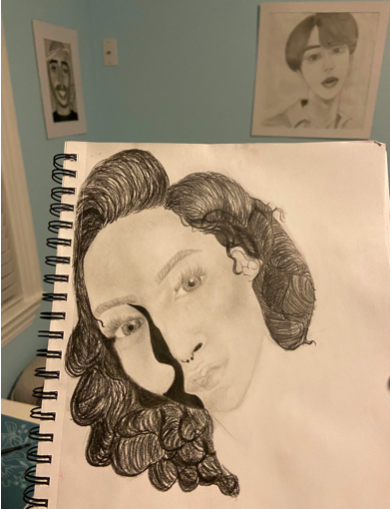The past few years have been a roller coaster for my mental health. I’ve lived between gaining independence, isolating myself, and moving in and out of 10 living situations over the span of 4 years. Maintaining relationships that didn’t feel nurturing or reciprocal was hurting me emotionally, mentally, and even financially. I went through a period of chaos and loneliness. I would say I’ve been through enough, but I’d do it all over again if it meant ending up where I am today.
Focusing on my mental health required me to be honest with myself about my self-sabotaging habits. One of my biggest habits was over-indulging in activities that once brought me happiness. So instead of doing that, I took time to learn about myself. I found comfort in figuring out what my true passions are, the kind of career and life I want for myself. I made an effort to stop dwelling on the “what-if” scenarios my anxiety generates for me. I no longer feel the need to hold space for people or things that aren’t fit for me. It hurt to realize that I kept relationships, friendships, and connections alive because I had lost sight of my self-worth. It also hurt to recognize that those people benefitted from my lack of boundaries. My mental health is still a work in progress, but I’m making changes; changes better fit for me, like setting limits to my generosity, learning when I need space and when I need company. Yes, I stumble occasionally, but I think I’ve done the necessary work to make me a priority.
Therapy felt useless some days like I was being overlooked and told things I had already heard before. However, therapy felt different after I was diagnosed with Complex Post Traumatic Stress Disorder. Unlike PTSD, which is caused by a singular event, C-PTSD is caused over a long period of time (several months or years) by a specific person or group of people. I laughed uncomfortably before asking my therapist how she came to her diagnosis. It wasn’t amusing once she stated that my symptoms demonstrated a lack of emotional regulation, memory repression, denial, panic attacks, depression, rage, dissociation tendencies, and a distorted perception of my abusers.
People with C-PTSD experience all of these symptoms, while also struggling with PTSD. The scary thing is that risk factors for C-PTSD include: childhood abuse or neglect, long-term domestic violence, trafficked victims, incarceration in war camps, witnessing repeated acts of violence, multiple traumas, trauma at an early age, abuse by a close family member or close family friend, and long-term trauma. Hearing all this felt confusing, but reassuring at the same time. My therapist noticed multiple abusers in my history and I immediately thought of five people that could fit those roles. Even if it doesn’t relate to my healing, it was strange to realize this. This type of trauma also impacts the chemical balance of the brain and so, I’m now in the process of seeing a psychiatrist.
Although writing this blog has been painful and it feels repetitive to explain my symptoms, I knew it was something I needed to do and have been avoiding. The reality of my experiences is that I knew I was bound to have some form of PTSD. Nobody from Richmond, CA is exempt from it, regardless of how much they deny it. I just didn’t expect to be diagnosed so quickly, but I feel no shame in it. I share my story to help others realize that it’s perfectly okay to be seen, as it’s also perfectly okay to take care of yourself.
I strive to fight the stigma around mental health because minority communities benefit from mental health services. We need community spaces that recognize lived experiences, without putting shame or guilt on them. Youth in our communities should learn how to cultivate healthy spaces and relationships for themselves, regardless of what they’ve been through. If you’re reading this and resonate with any part of it, know that you’re not a victim, but rather a survivor of your circumstances.

